Businesses rely on customers. That is a simple truth. Even as organizations develop products and offer multiple services, they look for customers who buy what they sell. Without the revenue generated by this transaction, how would they grow and develop more products to sell? Customers fulfill a fundamental need for businesses to thrive and flourish. However, as they grow and the number of customers increases, managing them and their expectations can become challenging.
It is a challenge that is best overcome by an efficient helpdesk system. Is there a system efficient enough to handle the routine demands of your customers, and is it worth the investment? The answer to both questions is a resounding yes. Therefore, it makes sense to understand all about helpdesk systems and how they can be leveraged to ensure that the exponential growth in the customer base continues and correlates with high customer satisfaction rates.
Related blog: AI in Customer Service: Revolutionizing the Helpdesk with 10 Cutting-Edge Examples
What is a Helpdesk System?

A helpdesk system is an application that helps organizations manage and track customer service requests. Its purpose is to streamline tracking and resolving customer service issues, from initial contact to resolution. The helpdesk system typically includes a ticketing system, which enables customer service reps to track and manage service requests. The method may also have a knowledge base, which can be used to store and share information about common issues and resolutions. It can also track customer service requests from multiple phone, email, web, and chat channels. And can also be used to track and manage service requests from internal employees.
Simply put, a helpdesk system can help organizations improve their customer service operations with a centralized place for tracking and managing service requests, including identifying and resolving common issues more quickly.
Why is a Helpdesk System important?
Today’s customers don’t appreciate waiting to get connected to the help they need or being put on hold endlessly. The more frustrated they become, the easier they can walk away from your competition. The more straightforward solution is to have a robust helpdesk system that will leave a lasting and positive impact on customers while increasing agent productivity and offering various benefits to business operations. For instance, a helpdesk management software:
- It gives businesses a central place to track and manage customer support requests.
- Helps companies prioritize and route customer support requests to the appropriate team or individual.
- Enables businesses to track customer support request trends and identify areas for improvement.
- Monitor customer satisfaction levels and take proactive steps to address any concerns.
- Save time and money by automating customer support request processes.
Therefore, a solid helpdesk system must be considered, especially for businesses that retain customers and ensure steady growth. Helpdesk management software has several essential features that offer solid and multiple capabilities to empower your customer support initiatives.
Features of a Helpdesk System
A Helpdesk System streamlines tracking and resolving customer service issues. It allows organizations to keep track of customer inquiries and problems and monitor and report on the customer service team’s performance. The main features of a Helpdesk System are:
Ticketing: Ticketing is tracking and resolving customer service issues. Customers can submit tickets through various email, phone, or web forms. The helpdesk software then assigns the ticket to the appropriate customer service agent.
Reporting: A Helpdesk system provides organizations with valuable insights into the performance of their customer service teams. Reports can be generated on various metrics, such as response time, average resolution time, and ticket volume.

Knowledge base: It is a collection of articles, FAQs, and other information that can be used to resolve customer issues. A Helpdesk system typically includes a searchable knowledge base so that customer service agents can quickly find the necessary information.
Live chat: As a popular customer service channel, live chat functionality is built into a Helpdesk System. This allows customer service agents to resolve real-time issues without making phone calls or sending emails.
Self-service: A self-service portal is a web-based portal that allows customers to find answers to their questions without contacting customer service. This can reduce the volume of tickets submitted to the helpdesk system and free up the agents to focus on more complex issues.
Many channels, one location: Helpdesks consolidate various support channels into one centralized location. Customers can move from channel to channel with zero interruptions. The support channels include A service portal, Virtual agents, Mobile applications, Integration with popular collaboration tools, and Walk-up experiences for in-person conversations.
IT support agents and their visibility: Support agents need more visibility into their activities when they use their mail to handle their emails and support tickets. A centralized helpdesk management system can help track their productivity and collect data to help the agents perform. It can also reduce the mean time to resolution.

Deep insights into customers and employers: The helpdesk system’s inherent analytics capabilities can provide insights into the history and trends of past interactions. These insights can offer a more personalized service experience. They also provide feedback with actionable insights into your products and services.
Automation-enabled: Helpdesk systems offer automation to eliminate routine, repetitive tasks, including employee notifications and assigning tickets to the appropriate agent or team. Automation helps free up the support agent’s time with a more reliable and accurate automated response.
Helpdesk management systems are here with scalable and reliable features to benefit businesses of all sizes, irrespective of the industry.
What are the Benefits of a Helpdesk Management System?
Customer satisfaction:
Customers want their queries resolved quickly and with minimal effort. You can ensure First Contact Resolution (FCR) by being proactive. Keep them informed with timely updates about the status of their complaint. You can also make it easier for them to reach out for support via the channel of their choice. A helpdesk ticketing system creates a ticket for every customer interaction, irrespective of the platform through which it is initiated.
Agent productivity:
Automating the repetitive tasks helps the support agents attend to more meaningful work. Using the vast knowledge base, agents can access a centralized information repository to help them quickly solve customer complaints. Also, the unified interface can provide agents with a 360-degree view of the customer, enhancing the agent’s ability to serve the customer well.
Streamlined operations:
A helpdesk system can streamline business operations to meet SLAs and prioritize tasks and actions. The intuitive graphs highlight the tracking and monitoring of the contact center and enable data-driven decisions to improve business processes.
Omnichannel Customer Support:
A centralized helpdesk management system puts control in the customers’ hands. You can meet their requirements with the channel of their preference, as the system can support multiple channels, including social posts, email, chatbots, direct messages, etc.
Scalability:
An intelligent helpdesk system will enable easier creation, sorting, and assigning of tickets, eliminating the need to hire more agents or upskill the existing service teams. Moreover, it will allow the senior agents to take on high-level work and additional responsibilities. The helpdesk management system offers scalability to grow the business without incurring other expenses on resources.
Prioritized tickets and routing:
An automated helpdesk support solution can distinguish high-priority queries. Based on the urgency, the tickets can be routed to the appropriate team based on skill and domain expertise.

At their most basic, helpdesks are where employees and customers can request and receive assistance with IT-related issues, especially when it is to do with products, platforms, services, and devices. A helpdesk may be a single employee with a deep understanding of relevant technologies and who can handle common problems.
In larger businesses, helpdesks may use a team of experts with software tools to address rising issues. Whatever the system, there are ways to make helpdesk management 100% effective. You may only need a few hacks to optimize your system for high customer satisfaction ratings.
Helpdesk Management System Hacks
- Ticket Automation: A helpdesk’s main objective is simplifying and streamlining your current processes. Nearly all of your core operations can be made simpler with a good helpdesk. For efficient ticket management, look at what you can eliminate rather than what you need to add. Ticket automation should be your first change for efficient ticket processing and management.
- Integration capabilities: Automation, BI, analytics, CRM, and AI-powered self-service are today’s essentials in a helpdesk system. A helpdesk system can’t be a stand-alone application and must have integration capabilities to work with applications that offer additional services. Flexibility is key to an effective helpdesk management system.
- Scalability and sustainability: The ability to scale up or down in helpdesk software is necessary. Any business aims to grow, and acquiring different systems as you grow is not only wasteful but also chaotic. You will be forever starting from scratch. Instead, a scalable helpdesk management system will grow at pace with your business and be sustainable in the long term.
- Enhanced end-user experience: It is no longer enough to resolve tickets and update the system with closed tickets, not if you want to retain your customer’s loyalty and business. A helpdesk management system is more than a tool if used properly. It is a way to enhance the overall customer experience. It must include shorter wait times, personalized attention, and multiple language options, making every step of the process meaningful. Your helpdesk system must be able to keep your customer yours for life.
Exploring Helpdesk Solutions? Here Are 10 Niche Solutions to Consider
Explore the leading 10 specialized helpdesk solutions to exceed customer support expectations. Curated for exceptional assistance and seamless experiences, these options optimize your support endeavors.
Freshdesk:
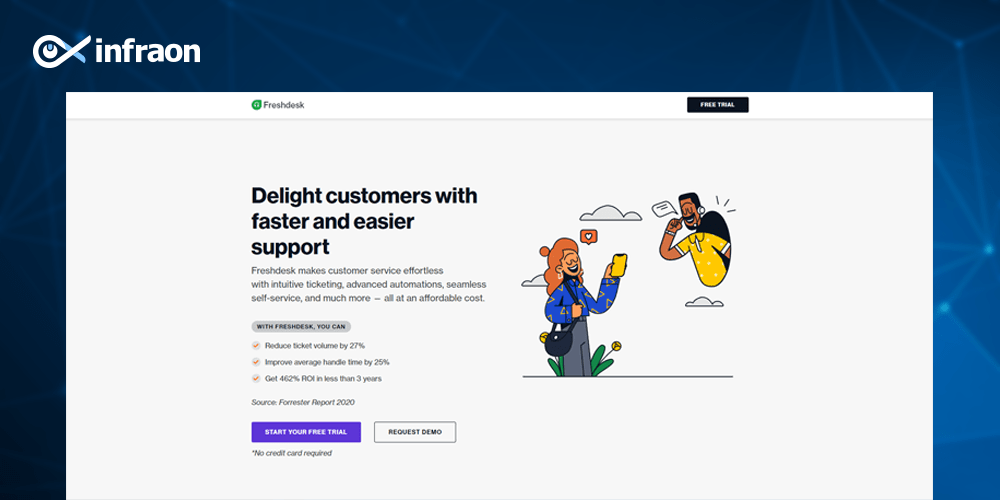
Freshdesk is online helpdesk software that lets you engage in more meaningful conversations every day, across every channel, with every customer. It simplifies multi-channel ticketing, provides intuitive customer portals, delivers faster resolutions with contextual insights, and makes support delightful for agents, customers, and admins. Also, it empowers teams with time-saving automation that includes in-context collaborations, advanced agent routing, and a rich knowledge base.
Freshdesk’s core lies in enhancing customer support. It offers intuitive portals for self-service, progress tracking, and accessing knowledge. With contextual insights, agents customize responses for quicker resolutions, boosting satisfaction. Automation, from collaborations to advanced routing, frees support teams from routine, enabling focus on complex tasks. This ensures a seamless, delightful experience for all.
Top features of Freshdesk:
- Multi-Channel Support
- Customer Portals
- Contextual Insights
- Automation
- Advanced Ticket Routing
- Integrations
- Knowledge Base
Prices: Free trial available. Plans start at $18 per agent/month.
Zendesk:
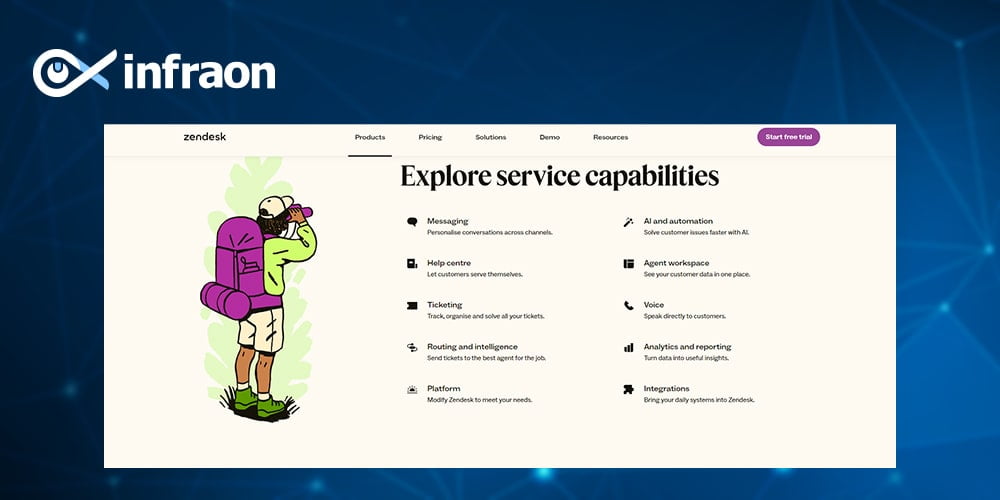
Zendesk is a versatile customer service solution that adapts effortlessly to your business growth. It simplifies customer experiences and empowers teams, minimizing hurdles for satisfying interactions. Agents, administrators, and internal teams benefit from its unified environment, fostering efficiency and collaboration.
With a dedication to coherence, Zendesk synchronizes your business operations, ensuring seamless alignment across all aspects of your organization. Its integrated help center and community forum empower customers to find solutions independently. Moreover, AI-powered bots enhance personalization, tailoring experiences for each customer. In this realm of seamless support, Zendesk becomes a dynamic force orchestrating exceptional customer service while harmonizing your business landscape.
Top features of Zendesk:
- Supports Multiple Communication Channels
- Built-in Help Center
- Community Forum
- Analytics and Reports
- Customization Options
- All-in-One Support
Prices: Starts at $55 per agent/month.
SysAid:
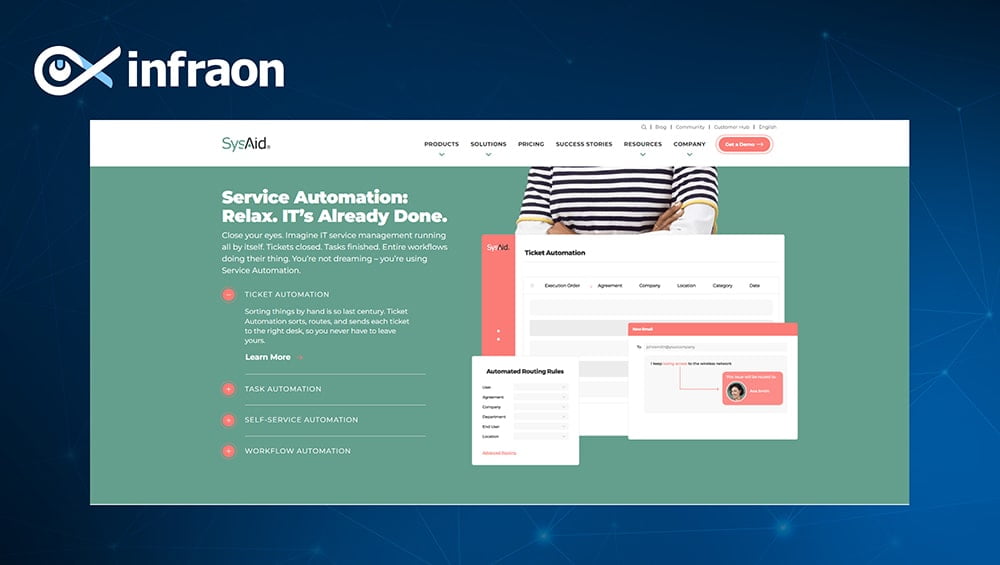
SysAid is a flexible helpdesk solution that handles tickets, resolves issues, manages assets, and all the other IT. It lets your teams skip the wait and solve common IT issues independently while delivering great end-user experiences with self-service automation. Automated password reset and one-click issue submissions give your employees the smooth experience of instantly resolving common IT problems independently. Also, it can easily manage all your IT assets and resolve issues faster with all the asset data and records.
SysAid excels in IT asset management, offering a centralized repository for all your IT resources. This centralized hub facilitates swifter issue resolution by providing support teams with easy access to asset data and historical records. The fusion of asset management and issue resolution optimizes operational efficiency and contributes to a proactive approach to IT problem-solving. As a result, SysAid stands as a multifaceted solution, capable of efficiently managing various facets of IT operations while empowering both teams and end-users alike.
Top features of SysAid Help Desk
- Helpdesk Ticket Management
- Issue Resolution
- IT Asset Management
- Self-Service Automation
- Automated Password Reset
- Centralized IT Resource Repository
- Collaborative Tools
Prices: N/A, please check their website or contact them for more details.
Salesforce Service Cloud:
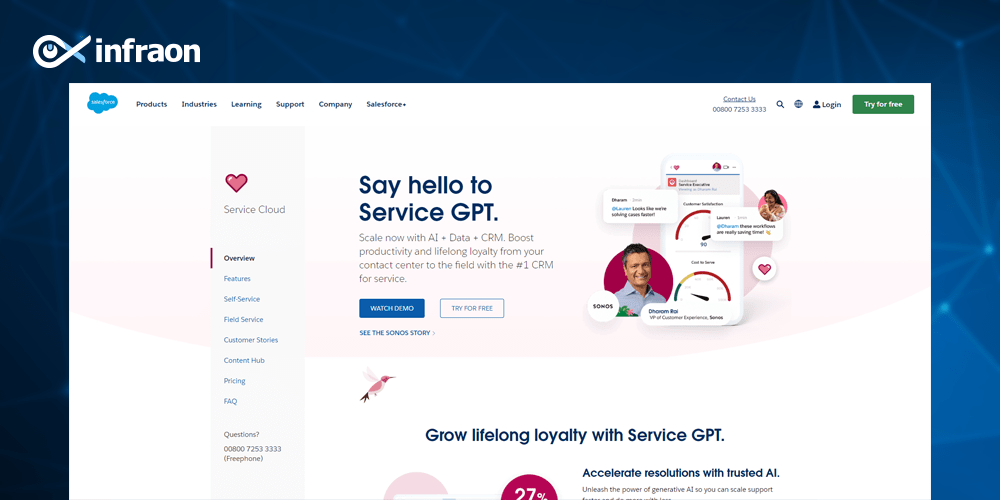
Salesforce Service Cloud is a great helpdesk solution for growing businesses. It offers 360-degree customer views, robust contact management options, automatic email-to-case creation, intelligent routing, and auto-assignment tools. You can automate repetitive tasks using this system, such as checking agent availability and call routing. You may also leverage its CRM capabilities so that you and your agents get easy access to all customer details, including contact information, purchasing patterns, and previous interactions. This way, giving clients a personalized customer service experience becomes simpler.
Service Cloud’s integration with Salesforce CRM provides insights into customer details, purchase history, and interactions, enabling personalized service and fostering loyalty. The seamless integration with other Salesforce tools supports data flow and cross-functional collaboration, which is crucial for expanding businesses. In essence, Salesforce Service Cloud is a must-have for growth, offering capabilities that empower outstanding customer service and enduring relationships.
Top features of Salesforce Service Cloud:
- Omni-Channel Support
- AI Insights
- Automation and Workflows
- CRM Integration
- Self-Service Communities
Prices: Starts at $27 per user/month.
Jira:
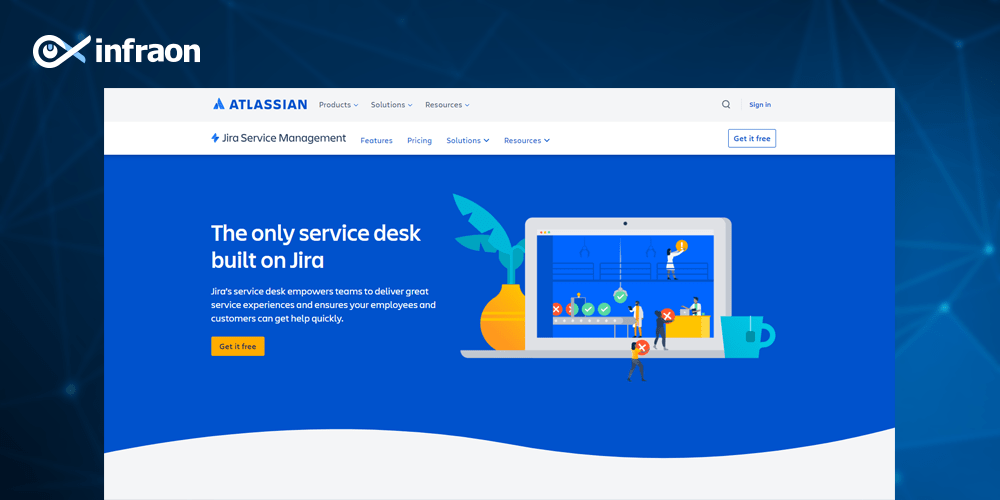
Jira service desk empowers your teams to deliver an excellent service experience and ensures your employees and customers can get help quickly. It allows agents to create and access customizable queues to prioritize, manage, and assign IT support requests. This ticketing tool brings development, IT support, and other teams to address user concerns. With its no-code automation engine, teams can save time and increase power by automating any task or process with a few clicks.
The Jira Service Desk is a transformative platform that empowers your teams to deliver exceptional service experiences, seamlessly catering to employees and customers. It provides agents with customizable queues, streamlining IT support request management and assignment. This tool goes beyond traditional ticketing, acting as a collaborative hub for development, IT support, and other teams to collectively address user concerns.
Top features of Jira Service Desk:
- Customizable Queues
- IT Support Management
- Team Collaboration
- No-Code Automation
- Self-Service Portal
- Reporting & Analytics
Prices: Free trial available. Plans start at $21 per agent/month.
Zoho Desk:
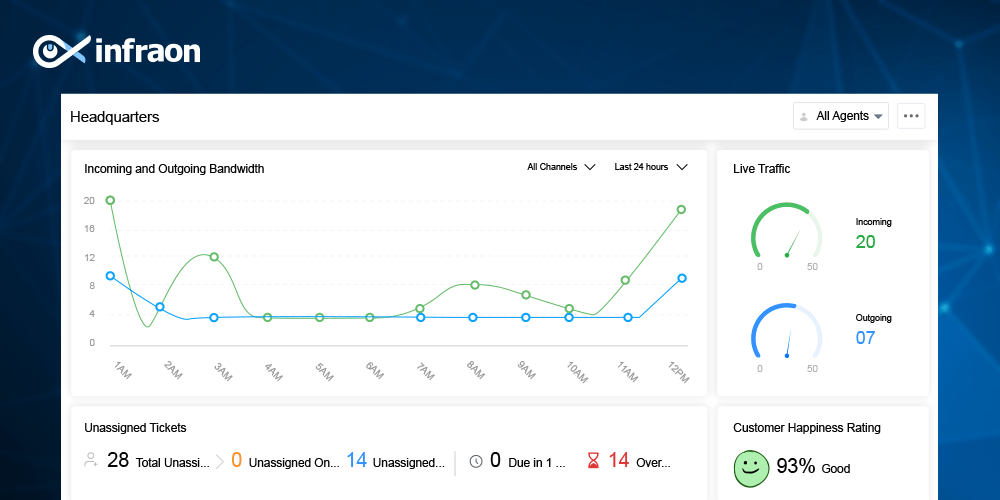
Zoho Desk is another excellent IT helpdesk software that acts as an omnichannel platform and lets you manage customer conversations across multiple platforms. It provides continuous support to your customers and your company’s employees. With Zoho Desk, you can assign, track, and access multi-channel tickets through a single dashboard. In addition, it lets you create a knowledge base for self-service, which includes FAQs, webinars, videos, and inquiries.
With the convenience of a single dashboard, you can assign, monitor, and access tickets from various communication channels. This unified approach ensures that inquiry is noticed and provides a cohesive view of customer interactions, enhancing your team’s responsiveness and resolution speed.
Top features of Zoho Desk:
- Omnichannel Support
- Ticket Management
- Self-Service Knowledge Base
- Automation
- AI-Powered Insights
Prices: Starts at $20 per user/month.
Infraon Helpdesk:
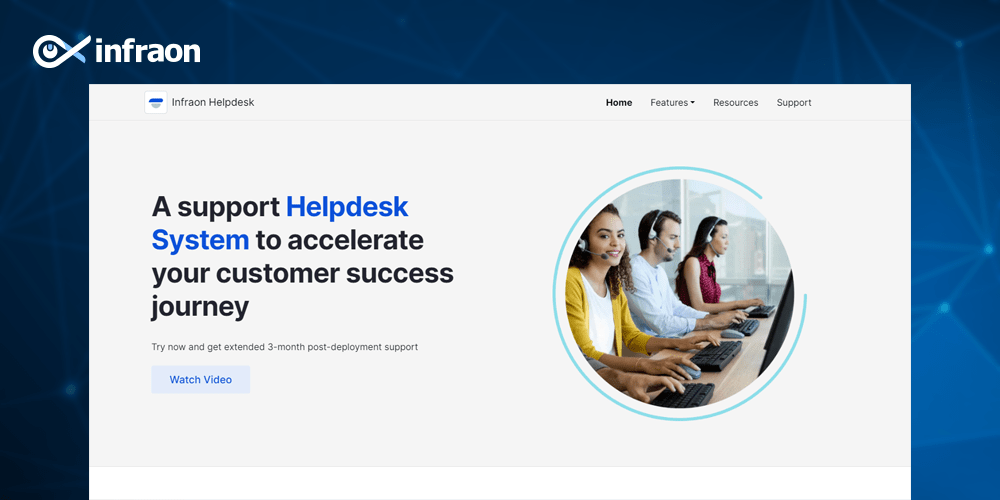
Infraon Helpdesk is a feature-rich, low-code platform that can enhance customer service journeys. It can bring your customers, agents, and internal teams together to provide consistent support. With its cutting-edge features like emailing the ticket, ticket creation via WhatsApp, and AI-driven chatbots, you can improve customer delight. It can also boost agent productivity and provide proactive customer service without dealing with a maze of features or poor data visualization. Infraon Helpdesk is unique because other relevant capabilities like asset management, network management, and ITSM can be easily integrated without switching platforms.
Infraon Helpdesk is a comprehensive solution that streamlines IT operations and enhances user support. It is a central hub for efficient issue tracking and prompt task allocation. Catering to internal and external stakeholders boosts customer satisfaction and loyalty. Robust knowledge management and adept automation empower self-service and improve operational efficiency. Infraon Helpdesk is a dynamic toolset that optimizes IT support, fosters collaboration, and aligns with digital needs.
Top features of Infraon Helpdesk:
- Centralized Issue Tracking
- Efficient Task Allocation
- Knowledge Management
- Automation
- Multi-channel Support
Prices: N/A, Please check-out their Website.
Help Scout
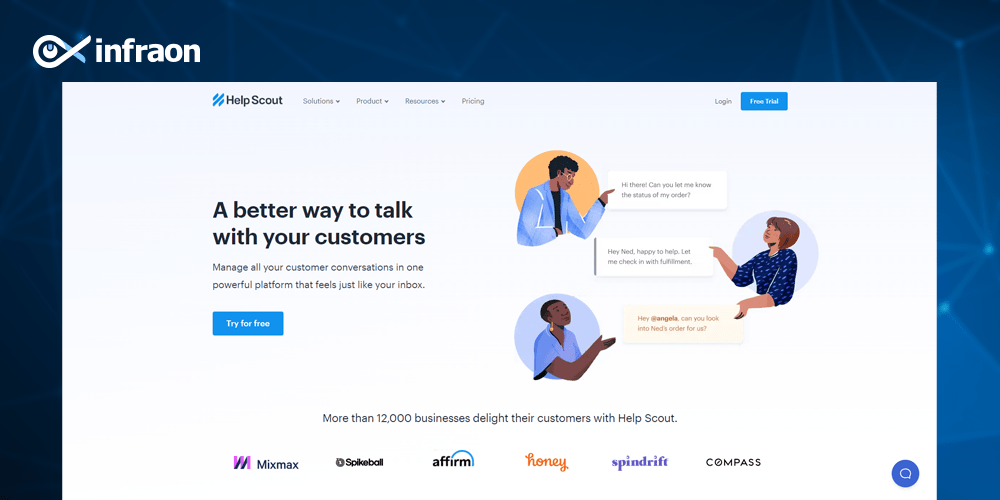
Help Scout is a customer support platform that delivers a personalized and human-centric customer experience. It is designed to help businesses manage customer inquiries, provide efficient support, and build stronger customer relationships. Help Scout stands out for its user-friendly interface, collaborative features, and emphasis on creating meaningful interactions. Help Scout is ideal for businesses seeking a customer support experience beyond traditional ticket management. Its focus on personalization and collaboration helps build stronger customer relationships and drive customer satisfaction.
Help Scout isn’t just a support solution; it’s a cornerstone for businesses aiming to elevate their customer experience. Personalization with collaborative tools paves the way for meaningful interactions that reverberate in stronger customer relationships and enhanced loyalty. With Help Scout, businesses embark on a journey where each interaction is a testament to their commitment to putting the human touch at the forefront of service excellence.
Top features of Help Scout:
- Personalized Customer Experience
- Efficient Customer Inquiry Management
- Collaborative Tools
- Meaningful Interactions
- Multi-channel Support
- Reporting and Analytics
Prices: Starts at $25 per agent/month.
HappyFox:
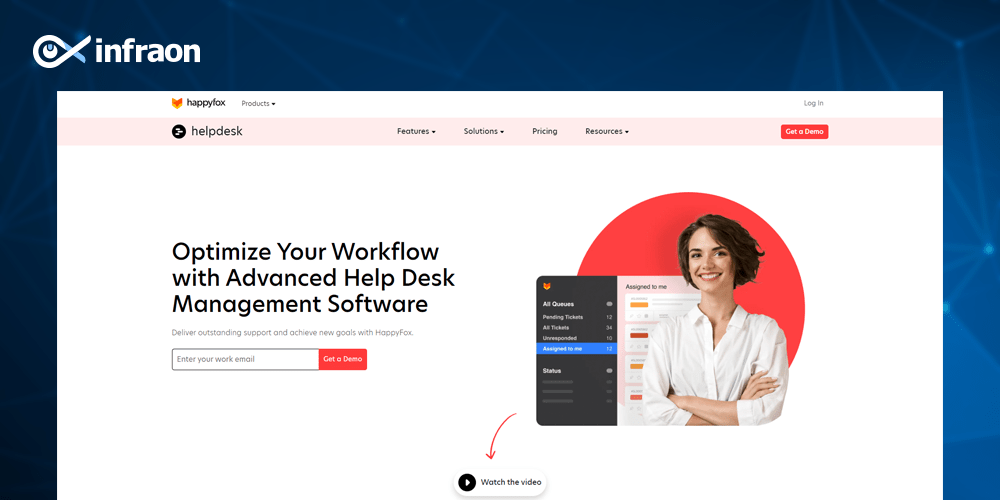
HappyFox is a versatile and innovative helpdesk software solution meticulously crafted to revolutionize and optimize the landscape of customer support operations. Its primary objective is to metamorphose traditional customer interactions into efficient, seamless, and gratifying experiences. By prioritizing delivering exceptional support, HappyFox introduces cutting-edge features and functionalities that seamlessly converge to amplify communication, automate mundane tasks, and foster collaboration among support teams, resulting in an elevated customer support paradigm.
HappyFox thrives as a catalyst for task automation, liberating support teams from mundane processes and equipping them to focus on value-added initiatives. This strategic approach optimizes resource utilization and paves the way for faster resolutions, contributing to a holistic upliftment of support operations.
Top features of HappyFox:
- Advanced Communication Tools
- Task Automation
- Collaboration Enhancements
- Multi-channel Support
- Self-Service Knowledge Base
Prices: Starts at $39 per agent/month.
Hiver
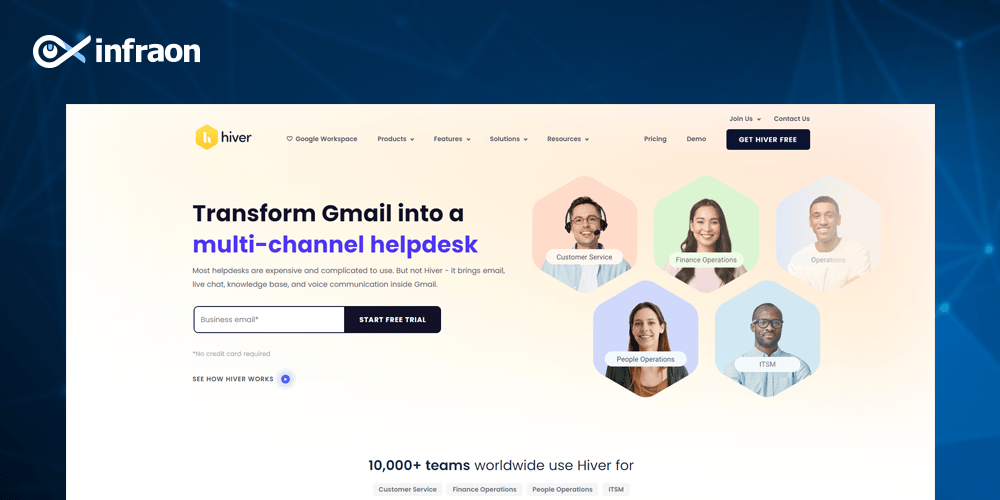
Hiver revolutionizes your Gmail experience by transforming it into a powerful shared inbox, fostering enhanced team collaboration. Seamlessly assign tasks, exchange notes, and track email statuses within Gmail. Elevate productivity by converting emails into actionable tasks, setting due dates, and easily monitoring progress. Maximize efficiency with shared email templates that ensure swift and consistent responses. Leverage analytics to gain valuable insights for optimizing customer support strategies. Experience streamlined email management and a remarkable boost in team collaboration through Hiver’s innovative platform.
Hiver’s arsenal also encompasses the power of shared email templates, where standardized responses become readily accessible, bolstering consistency and efficiency. The platform’s analytical underpinning provides invaluable insights, allowing teams to dissect performance metrics and glean actionable conclusions. This strategic vantage point paves the way for more informed decisions and strategic customer support optimization.
Top features of Hiver:
- Shared Inbox
- Task Assignment
- Email Tracking
- Email-to-Task Conversion
- Shared Email Templates
Prices: Starts at $9.67 per user/month.
Each of these supplementary products offers distinctive features and strengths, catering to specific business requirements and preferences in helpdesk systems.
Related blog: Exploring the world of helpdesks: A complete guide
Final thoughts
In wrapping up, the path to fortifying your helpdesk system has led us to an array of targeted solutions primed for amplifying its efficiency and impact. These ten niche strategies offer a tailored approach to tackling your helpdesk’s challenges, promising to elevate its performance in distinctive ways.
By adopting these solutions, you’re bolstering your helpdesk system and embracing a forward-looking mindset that welcomes innovation and progress. Remember to choose judiciously, engage your team, and maintain an adaptive stance to evolution. Your commitment to refinement will shape a more adept, customer-centric support system, propelling your organization toward enduring success. So, with these insights in tow, embark on this transformational journey, and witness your helpdesk flourish as a stronghold of unwavering assistance and growth.



















